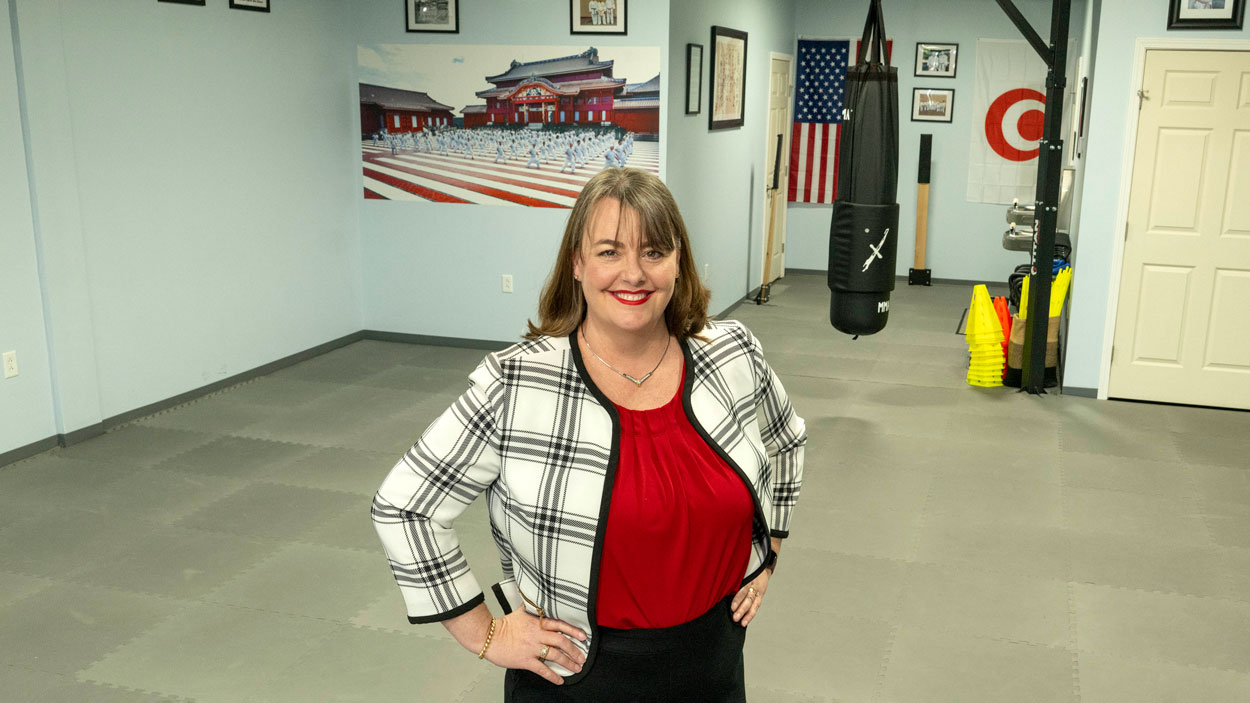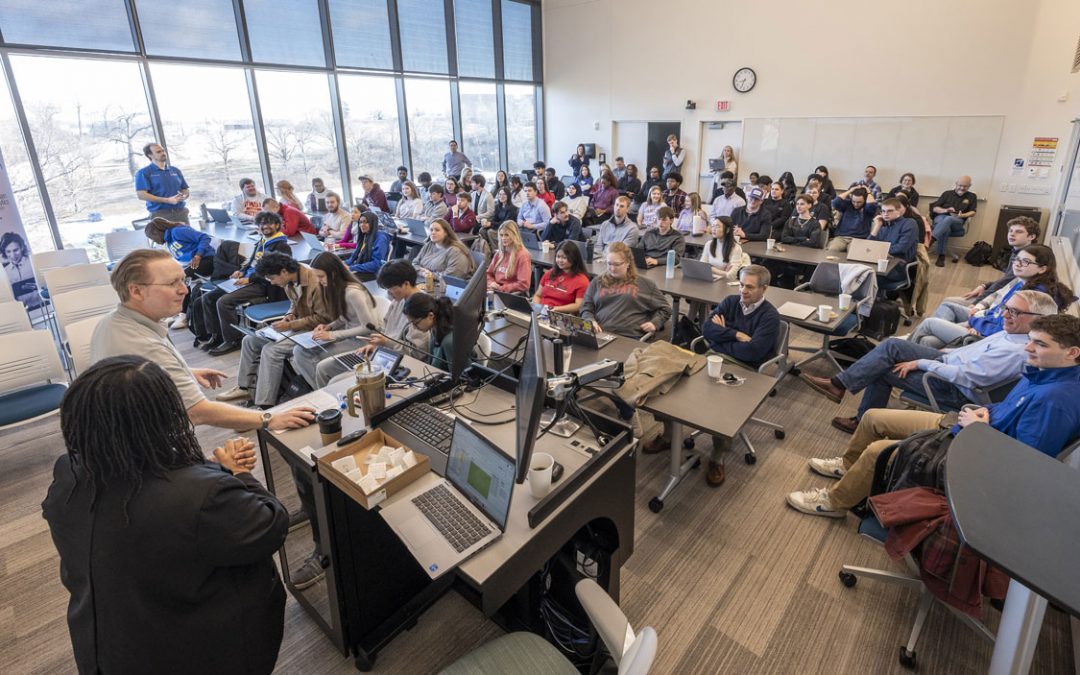
Faulkingham, who is studying in the College of Nursing’s DNP program, owns and operates Gateway Shidokan Karate in Maryland Heights, Missouri. (Photo by Derik Holtmann)
Stephanie Faulkingham has seen firsthand the transformative effect that karate can have on mental health.
When her oldest child, now 31, was around 7 or 8 years old, she and her husband enrolled him in karate to help with some bullying struggles at school. After seeing the impact karate had on him, she enrolled her youngest a few years later and decided to join him on the mat. Her kids’ interest in karate would ultimately wane as they grew older, but Faulkingham was hooked and continued to train.
“Treadmills are really boring, and karate is not boring,” she said. “We refer to it as walking meditation. No matter what’s happening in your day, there’s not much more that you should be thinking about when a fist is coming at your face. You get a mental checkout from the rest of the world. I see it as an exercise with a purpose.
“I grew up with a traumatic childhood – I was adopted when I was 8 and an emancipated minor when I was 17 – and karate gave me the confidence and skillset with the intent of never being a victim again. Having been the victim, I can recognize those fears and those challenges.”
A student in the College of Nursing’s DNP program at the University of Missouri–St. Louis, Faulkingham has now taught karate for more than 20 years. She owns and operates Gateway Shidokan Karate in Maryland Heights, Missouri, which specializes in Okinawan-style karate and recently celebrated its 1-year anniversary in its new location.
Over the years, Faulkingham has developed a niche working with many high-risk students, including women experiencing intimate partner violence, minorities and members of the LGBTQ community, as well as students dealing with anxiety, depression, PTSD and other mental health issues. To better address the needs of her students, she decided to pursue a degree in psychology.
After earning an associate degree from St. Louis Community College–Meramec in 2016, Faulkingham earned her bachelor’s in psychology from UMSL with a minor in child advocacy, a certificate in behavioral neuroscience and a certificate from the Pierre Laclede Honors College. She then returned to UMSL for the Accelerated BSN Program, earning 58 credits over 12 months to receive her bachelor’s degree in nursing.
In order to work as a mental health provider, she chose UMSL once again, enrolling in the College of Nursing’s DNP program with a focus on psychiatric mental health. She appreciated the flexibility of the highly rated online program and felt returning to UMSL was an easy decision.
“I thoroughly enjoyed my education with my first bachelor’s degree at UMSL,” she said. “I appreciate the cost-effectiveness and that it’s one of the three Tier 1 research universities in the area. I think a lot of times people don’t understand the high caliber of education that comes from UMSL. Whenever you compare the three local Tier 1 research universities – WashU, SLU and UMSL – of the three, UMSL is by far the most affordable and the education is just superb. The professors and the staff and the faculty have been absolutely amazing through all of my educational experience.”
Faulkingham’s education in psychiatric mental health has played a pivotal role in her work as head instructor and sensei at Gateway Shidokan. As a nurse, she’s able to treat stubbed toes and torn fingernails, but more importantly, she’s able to meet the unique physical, mental and emotional needs of her students and tailor classes accordingly.
“I kind of fell into this niche of being an individual who works well with special needs and trauma,” she said. “What I found was, having a background in psychology and mental health allowed me to tailor the content and the curriculum to developmentally appropriate levels, not just in terms of physical development but also on a cognitive, behavioral and emotional regulation level.”
Faulkingham works with many students with autism, for instance, who struggle with abstract thinking, so she adapts the learning material so that she’s not overloading those students with explanations that are not yet cognitively appropriate. She’s also worked with several women in high-risk relationships and marriages, helping them build confidence and establish physical, emotional and psychological boundaries.
“We have to handle the intimate partner violence situations very carefully and in a trauma-focused manner so that we don’t retraumatize, but we’re able to address the concern and learn to live around that experience,” she said.
Faulkingham is on track to graduate with her DNP in the summer of 2025. Afterward, she’d like to work as a nurse practitioner, ideally in an outpatient setting working with children, adolescents and emerging adults.
She won’t be leaving karate anytime soon. Since she’s been teaching for over 20 years, many of her students who started learning karate at 4 or 5 years old are now graduating college and starting families. One day, she hopes to teach their kids.
“I’ve seen a lot of people who have come and gone, but during the time that they’re with me, they have learned confidence and how to defend themselves,” she said. “It’s tremendous to see.”














